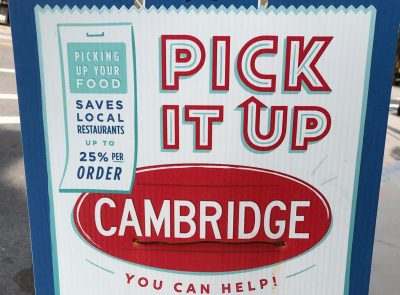By Ariane Vigna
Some Harvard Square restaurants have joined delivery apps to attract customers during the pandemic, but these apps charge fees that make it difficult for restaurants to turn a profit.

When delivery sales increased, restaurant owners suffered revenue losses as they paid fees to third-party applications such as UberEats, Grubhub and DoorDash. Now, since many universities have canceled in-person classes, business owners fear having to close their doors permanently and try to come up with long-term solutions.
“[During the pandemic], small companies like Grendel’s Den went from being a terrific cool bar to selling groceries in order to stay relevant,” said Denise Jillson, executive director of the Harvard Square Business Association. “Restaurants were disappointed to have to turn to platforms like Grubhub or Doordash, but it was a matter of survival.”
Jillson, whose association has 400 members, said 25 restaurants in Harvard Square have closed permanently, and more are expected to close in the first quarter of next year.
Shoshana Garber is the manager of the Black Sheep Bagel Cafe, a locale offering bagels, spreads and sandwiches near the Harvard Kennedy School. She said she turned to UberEats to offer a delivery option during the pandemic.
After six months on UberEats, Garber said she “can’t wait to get off” the platform, which takes a 30-percent commission on online orders.
John Schall, owner of Mexican restaurant El Jefe’s Taqueria, saw his delivery sales skyrocket from 25 to 75 percent of his total sales when the pandemic began, but these were less profitable because of delivery fees.
Small business owners have lobbied state representatives to pass a bill that would cap fees from delivery companies at a 15-percent commission on every order.
The Massachusetts House on July 28 incorporated the delivery-fee issue into its economic development bill that addressed topics associated with the pandemic, but the Senate version of the bill did not include language about delivery fees. A committee has been created to resolve the differences in the two bills.
In an effort to support local eateries while negotiations between elected officials were underway, the City of Cambridge, in partnership with the local business community, launched the social media and print campaign “Pick It Up, Cambridge.” The campaign encourages customers to pick up their orders so that businesses retain more profits.
“We couldn’t sit around and wait for legislation,” said Jason Alves, executive director of the East Cambridge Business Association and member of the City Manager’s Small Business Advisory Committee. “We needed to take action.”
Assistant to the City Manager Matthew Nelson said the campaign came about quickly as Cambridge recognized the urgency of the situation.
“There’s not a business out there right now that isn’t trudging through all this,” Nelson said. “We’re trying to use all the tools in our toolbox to support them.”
Business owners said they have noticed an increase in pickup sales but cannot say to what extent that change is linked to the campaign.
The City of Cambridge launched the initiative without a strategy to measure its success, Nelson said. Cambridge will work on measuring its impact in the coming months, as temperatures drop and customers turn to delivery options again.
Schall said he appreciates the City’s efforts to support business owners, but that his focus remains on passing legislation.
“As great as these things were, they pale significantly in comparison to what would happen if we could get this fee cap,” Schall said. “The problem wasn’t addressed.”
























































































































